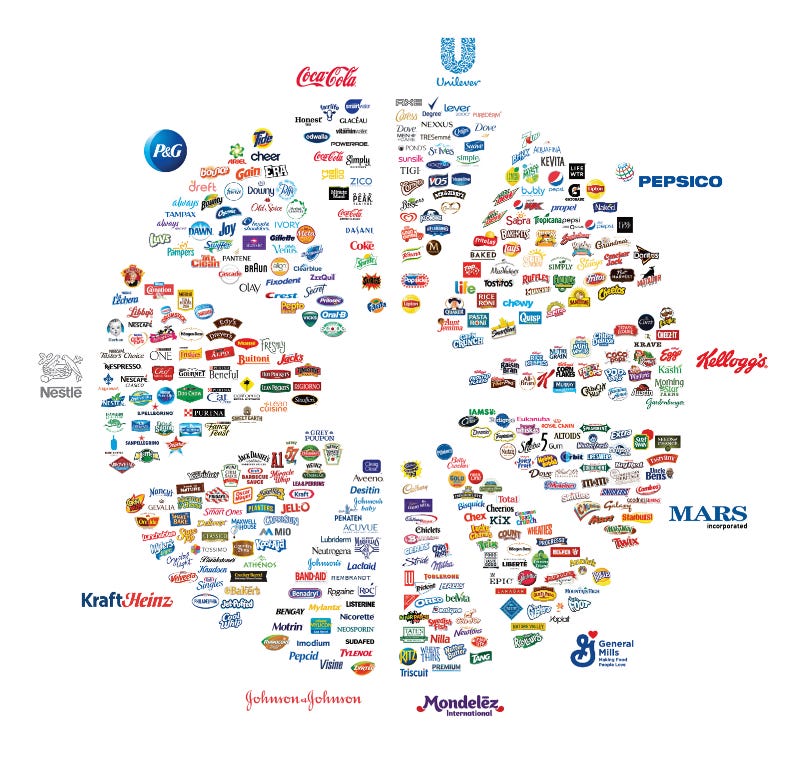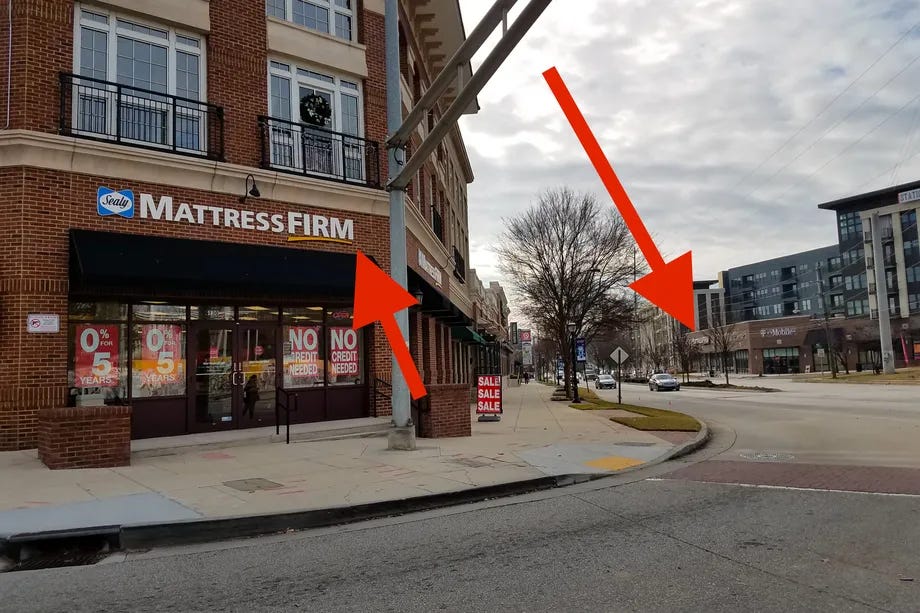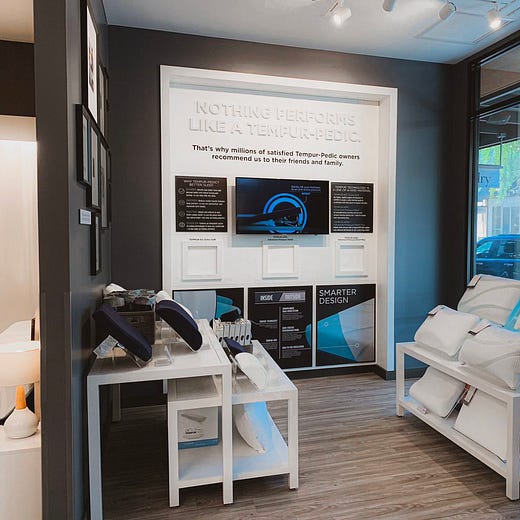Future of a Tempur-Owned Mattress Firm
What happens if mattress companies vertically-integrate at the highest level?
After filing for a much-anticipated IPO exactly one year ago, Mattress Firm ($MFRM) ultimately called off the plan, laying blame to the economic downturn.
The mattress retailer first filed for the IPO in January 2022, indicating it was looking to raise $100M, a number that was likely a placeholder and subject to change. Shares were expected to trade on NYSE under the symbol MFRM.
The IPO would have marked a return to the public markets for Mattress Firm, which was taken private by Steinhoff International (OTC:STHHF) in 2016 for $3.8B. The retailer ended up filing for bankruptcy in 2018, but emerged a month later. It shuttered around 700 stores as part of its reorganization.
The IPO was supposed to be Mattress Firm’s redemption arc. The company’s demise began in 2018 when its newly anointed South African owner, Steinhoff International, capsized in an accounting scandal spanning multiple continents and dragged the subsidiaries down with it. In short order, an executive cleaning crew used the opportunity to exit leases on 700-odd redundant stores (like the ones you would see facing each other on the corner) under cover of a chapter 11 restructuring.
A ray of hope did come with the post-pandemic housing bubble, and the business happily served up 0% interest-financed mattresses for all the new movers. At the tail-end of that period, grabbing the opportunity to paint a narrative of perpetual hockey stick growth, Mattress Firm filed the S-1. Unfortunately, though, as we saw with many other parts of the economy, as quickly as the sales came they were gone.
For Steinhoff, with better luck and timing, a successful Mattress Firm IPO could have been a boon for its own (in)solvency.
Meanwhile, Steinhoff has been found to be technically insolvent. In mid-December it announced reaching an agreement with some of its largest creditors to extend its debt maturity. In the new proposal, creditors have 80% economic interest in Steinhoff, with shareholders retaining just 20%, housed in an unlisted entity.
The news saw the share plunge over 60% and remain around R0.50. The former Top 40 share – which fell from grace after a massive accounting scandal came to light in 2017 – is down over 99% from its all-time high of close to R100 in 2016.
Predicted a year ago on finance twitter:
With the exit path torched, the markets are now speculating on Mattress Firm’s next move. This (suspiciously confident?) speculation by Wedbush expects that Tempur-Sealy could snatch up the retailer for cheap, considering “the possibility of very accretive acquisitions—namely Mattress Firm.”
Further, Basham sees [Tempur-Sealy] as a potential acquirer of the Mattress Firm after it abruptly withdrew its plans to IPO on Monday.
“We believe that Mattress Firm is a candidate for acquisition particularly after it officially withdrew its IPO yesterday, just over a year since it filed to go public. Moreover, parent company Steinhoff’s most recent statement in mid-October suggests it could be strongly considering options other than an IPO,” he explained. “TPX is the most logical strategic buyer given its size and the fact that it has been successful in its recent acquisitions of leading UK retailer Dreams and Southeast US retailer Innovative Mattress Solutions.”
Given these potential share catalysts, Basham added Tempur-Sealy to his Best Ideas list and hiked his price target to $45, up from $30.
What a Tempur acquisition could look like
Without a doubt, Mattress Firm would be the holy grail for a mattress manufacturer operating at the scale of Tempur-Sealy (or Serta Simmons). Overnight, the acquiring company could double or triple sales by maximizing distribution in over 2,300 Mattress Firm stores.

Essentially, Tempur would fill Mattress Firm’s floor space with all of its own brands: Tempur-Pedic, Stearns & Foster, Sealy, and Cocoon. Many consumers don’t know or don’t care if all the brands are actually made by the same company — the same as shopping at Trader Joe’s. They want the illusion of choice. Tempur could even spin up additional brands to fill in the gaps (e.g. beds for gamers). Moreover, as a bonus, competitors heavily relying for growth on the Mattress Firm sales channel (Purple) would get wrecked through displacement, creating further opportunities for consolidation.
Why it probably won’t happen though
However, the chances of Mattress Firm getting acquired by Tempur-Sealy are slim. The pump-and-dump for the numbers would be a short-term play, and Tempur’s management can probably see the risks in further tarnishing the Mattress Firm brand.
Current financial constraints aside, the reverse scenario would make more sense. Suppose Mattress Firm, as the retailer, were to acquire a collection of product brands like Tempur-Sealy. In that case, Mattress Firm could increase the display priority for its own brands (a la Beats and Apple Store) while maintaining the perception of neutrality (Amazon’s private label play). Mattress Firm already has a growing collection of private label mattress brands such as Sleepy’s and the god-awfully named Tulo bed-in-a-box, so this would be nothing new.
But the same benefits do not apply the other way around, where one of the product brands owns the retailer that is at the same time trying to sell third-party products. The value in the retail chain is keeping a semblance of independence towards both consumers and partner brands. It would be uncanny for a Mattress Firm salesman to compare the virtues of one brand against another when it’s all coming from the same factory.
Furthermore, acquiring Mattress Firm would conflict with Tempur-Pedic’s own branded stores. Tempur owns and operates ~100 of these stores in prime locations, and they are a bespoke, premium experience compared to your typical Mattress Firm hanging out in a strip mall.
At this point, Tempur-Sealy is a well-oiled cash printing machine focused on milking its super brands. Acquiring a retail Frankenstein — conceived through a long history of rollups such as Sleep Train and Sleep America — would be akin to tossing a grenade into the Tempur org. A small army of McKinsey consultants would be in their offices the next day, spitting out 100-page decks on change management and strategic transformation. The two organizations, polarized by entirely different cultures and strategic focus areas, would likely cause havoc. Tempur-Sealy’s core competencies should be brand marketing and manufacturing, not retail and merchandising.
So that leaves the question, who will take Mattress Firm off of Steinhoff’s hands? At one point in the past, there was speculation that Amazon would be a potential acquirer of Mattress Firm as a relatively cheap way to bully their way into the furniture category. But those days are long gone, and Amazon is now shutting down physical retail-related operations, including their own 4-star stores or whatever they were terribly named. So for better or for worse, it may be time for private equity to play musical chairs and for Mattress Firm to get handed off to the next one.










